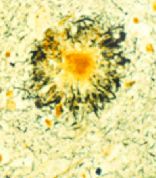
Medical News Today reports on a study that will appear in the September issue of the Journal of Clinical Investigation. The results show that beta-amyloid peptides (the protein that forms thick deposits in the brains of people with AD) form a complex with copper ions in the AD brain. This complex forms on cholesterol and generates hydrogen peroxide from oxygen that leads to oxidative stress.
The significance of all this is that this reaction might explain why high cholesterol is a risk factor for AD, and why copper-binding drugs and statins are useful for the treatment of AD.
The findings are complementary with the results of a 6-year study published in the August issue of Archives of Internal Medicine. In more than 3700 adults, “high dietary intake of copper in conjunction with a diet high in saturated and trans fats was associated with accelerated cognitive decline.”
Interestingly, high copper intake in the absence of saturated and trans fats was not associated with accelerated cognitive decline.
Illustration: Neurofibrillary tangles and fiberlike processes of neurons (black) surround an amyloid plaque. Source: Chemical and Engineering News
8/14/06 21:17 JR